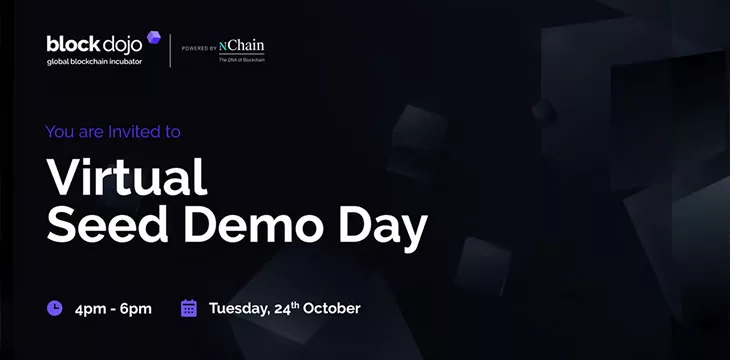|
Getting your Trinity Audio player ready...
|
Combining blockchain with the newest AI tools will build great services for online learning, travel, the music and publishing industries, and social networks. That was the message from startup incubator Block Dojo‘s first Virtual Seed Demo event this week. The six projects picked from the Dojo’s previous programs (or “cohorts”) were shining examples of great ideas followed through, each making its own clear use case for enhanced blockchain-based apps.
Block Dojo said this event “marks our first online event for investors to discover high-potential, fast-growing deal flow.” It promised an audience of over 150 investors that included EIS funds, VCs, angel syndicates, family offices, and others. Hosted by Block Dojo’s Gareth Hawkins and Eva Dobrzanska, the online session brought in each startup founder to face live questions from investors about their plans.
All participants received a package containing the six startups’ pitch decks and meeting invites to talk in-depth with the founders of their choice at a later date. Block Dojo also called for investors interested in blockchain, the Dojo, and its work to join its Mentor Network, adding any unique business knowledge they may have to an existing pool of volunteers.
Any AI tools should be built on blockchain
The six projects pitched, and indeed all projects Block Dojo incubates were blockchain-based and stressed the need for users to own and control their own data. The founders, however, were sparing in their use of the word “blockchain” and focused on data ownership benefits instead, probably to everyone’s relief.
Other than blockchain, the most noticeable theme from the pitches was the integration of AI tools—every founder mentioned them several times and Block Dojo promotes this as one of the key areas in which the incubator can assist. As Dobrzanska said, “the two really go hand-in-hand now,” and “it wouldn’t be 2023 if we didn’t mention AI.” Blockchain itself brings authentic data to AI. AI feeds on larger data sets, and blockchain makes these mountains of data more trustworthy and embeddable.
Most of the founders were also skilled at presenting their companies’ origin stories, or “narratives” (as goes another popular 21st-century startup trend), along with their experience and abilities to network within their industries. The must-haves mentioned here are not cliches, however, but important hooks to grab investors’ attention and demonstrate a clear commitment to the projects they’ll be buying into.
So who pitched, and what were they offering?
Each of the six pitches involved a video and/or demonstration displaying varying levels of slickness, and all showed off applications that (even in the beta phase) featured gorgeously designed UIs and a readiness to start reaching out to wider markets right away. Indeed, most founders said they intended to use their next investment round mostly for marketing and advertising.
Kurero: the voice-based social network
Founder Laura Igwe said society is enduring a “superficiality pandemic” leading to ever-increasing isolation and socio-psychological problems like extremism, division, polarization, and abuse. Current social media offerings share much of the blame for this, encouraging negativity and impersonal text-based conversations (and arguments) with anons, as well as topic glossing.
Kurero aims to solve this by enabling the next generation “to build deeper, authentic friendships, relationships, and communities.” Its key selling point is “real voices”—you don’t type anything that appears in posts; users speak into their microphones, and Kurero transcribes them into written paragraphs. On the surface, it appeared similar to other social networks, but the voice- and conversation-oriented interactions would help it chase a share of projected (by 2030) global markets for podcasting ($149 billion) and online networking ($310 billion), Igwe said.
Libraro: self-publishing that actually sells books
Here’s a tool this writer wishes had existed a few decades ago. As anyone who’s ever attempted to have a writing career knows well, only about one percent of manuscripts submitted to literary agents ever become books, and of that tiny share, only two percent ever turn a profit. As founder Arsim Shillova noted, these odds make it more like staking your career on a lottery.
The internet sparked a self-publishing revolution that promised to overcome that problem, but in many ways, it made things worse—authors can self-publish to their hearts’ content and sell on major platforms like Amazon (NASDAQ: AMZN) but still achieve only single-figure sales. Libraro won’t solve that problem entirely, but as “the world’s first digital literary agent,” it can boost unknown authors out of obscurity.
Shillova stressed his company, which already has a GBP2 million (US$2.44 million) IP licensing deal with nChain, is also collaborating with major authors’ groups for access to their databases and is negotiating strategic partnerships with eight publishers.
Libraro provides tools to upload profile pages, writing samples, synopses, and other useful background information about a writing project. Authors have a data analytics dashboard to see who’s showing interest in their work (assisted by nChain’s blockchain publishing, data insights, and community management processes) and adjust their message to reach the best potential audiences.
“This makes us quite unique in the market, we can do things publishers want to but can’t yet,” Shillova added, saying his exit strategy would be to follow companies like Goodreads and Audible in an acquisition by a major online seller, likely Amazon.
SphereTrax: build your catalog of quality licensed audio material
Hawkins notes SphereTrax‘s pitch video was “super slick” and that its founders clearly knew what they were talking about through decades of hard slogging through the entertainment industry. CEO Sefi Carmel certainly has a pedigree and is using it to tailor a music-licensing platform that gives buyers and sellers exactly what they need.
SphereTrax addresses the problems of existing music-licensing services with enhanced search (including the ability to search with “emotional terms” and mood). Its AI can suggest appropriate tracks for any video, marketing, or advertising project, even from vague, plain English descriptions. As a high-end B2B project, it makes all tracks available in Dolby Atmos format, something that has attracted attention from Dolby itself.
SphereTrax is “ready to press the button and embark on our seed round” and is also looking into more B2C offerings aimed at YouTubers, TikTokers, and streamers whose output is becoming ever-more professional as affordable access to services like these improves.
Mintelium: prove you are who you say, and let employers verify it
Notably, founder Sashen Naicker was the only Block Dojo pitcher to mention “BSV blockchain” by name, saying it was the only blockchain network that satisfied Mintelium’s focus on security, privacy, and scalability. Hawkins said he was “delighted” to hear about the BSV choice.
Mintelium works on the “self-sovereign ID” principle by giving its users a place to store verified official credentials like passports, driver’s licenses, and qualifications. For employers, it’s a place to search for potential employees by credential and/or vet them to ensure they’re honest.
The platform deploys zero-knowledge proofs (ZKPs) to allow verification of claimed credentials without revealing private information. “Others are talking about this, but no one’s actually built it,” Naicker said. Many talk about secure, self-sovereign ID platforms, but it’s mostly just talk. Mintelium has actually built something that works, giving the startup a clear first-mover advantage.
HQ NFTs’ JurnyOn app: no more travel tickets
Startup HQ NFTs billed its mobile travel-oriented app “JurnyOn” as “the world’s first blockchain AI travel app (which) simplifies public transport for tech-savvy travelers, offering secure, seamless multimodal journeys.”
At this stage, its focus is on U.K. railcards and student passes, digitizing these documents and thus streamlining the buying and ticket-use experiences while helping to combat fraud (which is apparently rampant under existing systems). Railcards and passes are tokenized as non-fungible tokens (NFTs) and are verifiable on the blockchain, along with their buyers’ proof of ID.
Founder Divya Prashanth said the startup is already working with Transport For Wales in the U.K., becoming the first project to digitize rail tickets and make trip planning easier. JurnyOn “is already earning revenues,” and Prashanth said the GBP1 million (US$1.221 million) seed funding it sought would act as more of a “cushion” to ensure it gets through those difficult initial stages.
“We’re looking at all kinds of secure data management,” Prashanth said, with Hawkins noting the paper savings alone “will be incredible.”
ExamSolutions (by Visely): I liked this STEM e-learning platform so much I bought the company
Among these pitches, it was a tough call, but founder Michael Olagunju probably had the best startup narrative of the bunch. Originally, his company was an e-learning platform with a single tutor named “AirMaths,” and ExamSolutions was a similar service that had existed since 2009. Olagunju had used ExamSolutions to kick-start his own math education, which eventually led to a career as a City trader in London.
With that success, a passion for helping others to educate themselves, and an opportunity that presented itself, he acquired Exam Solutions (partly as a show of appreciation to its founder) and is turning it into a personalized, gamified STEM educational tool with features to encourage both teachers and students.
Today’s society faces a drastic shortage of teachers, leading to school class overcrowding, inefficient assessment, and overall poor effectiveness at achieving educational goals. Teachers, as well as potentially gifted students who face struggles outside the classroom, eventually lose motivation.
Now, ExamSolutions “fills the teacher void via AI tutoring.” That’s not just buzzword deployment either—the platform pitched showed off personalized and gamified motivational tools with assessments based on a “Visely Score” Olagunju said was popular with its users. It had AI tutor chat support, as well as a network of over 100 real-human STEM tutors providing on-demand access to answer students’ questions. It tailors materials and pace according to each student’s ability and circumstances, with insightful analytics that track and predict progress.
ExamSolutions is forming partnerships with “teacher influencers” who already have large followings online to serve as company ambassadors. Olagunju noted that as well as acquiring the company that helped him get started, he’s “not afraid to aggressively acquire other content channels to expand our reach.”
BlockDojo selected the six pitches from several of its previous “cohorts” to feature in its first Virtual Seed Demo and clearly chose ones with well-established and working applications from a variety of industries. In the accompanying chatroom, investors’ most common question was, “how do you intend to monetize?” however (unlike so many pitches this writer has heard over the years), Block Dojo’s founders were ready with satisfying answers.
Overall, the variety showed how versatile blockchain, and particularly a scalable blockchain like BSV, can be and why it’s rarely necessary to even mention that to end-users and those putting up the money. Block Dojo will continue to host events like these, as well as its usual in-person Seed Demo Days, to generate even more interest in the technology.
Watch: Block Dojo Philippines bets big on blockchain tech startups

 07-18-2025
07-18-2025 





